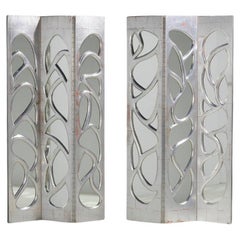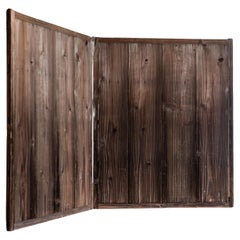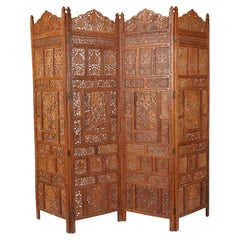Phillip Lloyd Powell Screens and Room Dividers
An American woodworker known for a wide range of furniture that is sensuous, sculptural and imbued with character, Phillip Lloyd Powell is an iconic figure in design. His organic style transcended the conventions of popular mid-century modern furniture and is best reflected in the vintage cabinets and tables for which he is renowned.
“I am an artist working with furniture,” Powell once said. But the self-taught furniture maker wore a number of different hats throughout his lifetime. He crafted handmade furniture as a teenager at his boyhood home and went on to study engineering at what is now Drexel University. Powell served in the Army Air Corps during World War II, and, on his return, he established his first showroom in New Hope, in his home state of Pennsylvania, stocking furniture from Knoll, Herman Miller and Isamu Noguchi.
In New Hope, Powell encountered fellow furniture designers Paul Evans and George Nakashima. The latter, a master woodworker who preferred a personal approach to design over industrial methods and materials, encouraged Powell to concentrate on making his own furniture. When Powell did so, he’d experiment with Nakashima’s unused stock of wood, drawing on natural world forms for seating and shapely coffee tables.
Evans, who moved to New Hope in 1955, was invited to share Powell’s studio space. Powell’s furniture design practice really took off and a collaboration with Evans put into motion the 1960s American Studio Craft Movement, which came to include furniture designers Wharton Esherick and Sam Maloof. The decade-long partnership between Evans and Powell yielded stone-topped tables, walnut chests with sculptured metal exteriors and more.
Powell was inspired by Evans’s artistry as a jewelry designer — he was a skilled welder whose Cityscape pieces are milestones of brutalism. Powell, in turn, encouraged him to turn his sculptures into furniture. Like Evans, Powell incorporated a range of materials into his work, rendering the interiors of his hand-carved cabinets alluring and distinctive with applications of silver leaf and fabrics.
The sinewy arms of Powell’s famous New Hope lounge chair are representative of his broad expertise with wood and his ability to make graceful yet functional furniture. He worked slowly, and the influence of the natural world remained a driving force in his designs. Powell produced approximately 1,000 pieces while he lived and worked in New Hope until his death in 2008.
Find vintage Phillip Lloyd Powell furniture on 1stDibs.
1960s American Vintage Phillip Lloyd Powell Screens and Room Dividers
Wood
1920s Japanese Primitive Vintage Phillip Lloyd Powell Screens and Room Dividers
Wood, Cedar
Early 20th Century Indian Anglo-Indian Phillip Lloyd Powell Screens and Room Dividers
Teak
21st Century and Contemporary Portuguese Phillip Lloyd Powell Screens and Room Dividers
Gold Leaf
21st Century and Contemporary Portuguese Phillip Lloyd Powell Screens and Room Dividers
Travertine
19th Century Moorish Antique Phillip Lloyd Powell Screens and Room Dividers
Upholstery, Teak
Early 20th Century Neoclassical Phillip Lloyd Powell Screens and Room Dividers
Wood, Paper
2010s Italian Phillip Lloyd Powell Screens and Room Dividers
Wood
19th Century Antique Phillip Lloyd Powell Screens and Room Dividers
Teak
1940s American Mid-Century Modern Vintage Phillip Lloyd Powell Screens and Room Dividers
Rush
18th Century Italian Baroque Antique Phillip Lloyd Powell Screens and Room Dividers
Canvas, Wood
19th Century Unknown Tribal Antique Phillip Lloyd Powell Screens and Room Dividers
Teak
19th Century Unknown Tribal Antique Phillip Lloyd Powell Screens and Room Dividers
Teak


